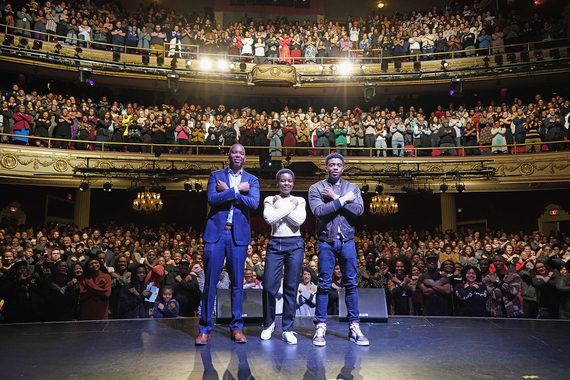The world famous Apollo Theater is celebrating its 85th anniversary this year, and its executive producer, Kamilah Forbes, sat down with Blavity to discuss the storied space’s impact and her vision for its future.
As you likely know, the theater was founded in Harlem in 1934. According to Forbes, the Apollo’s founders found success by taking what was then a popular form of entertainment, vaudeville, and fashioning it into one of the theater’s signature programs, its amateur night.
The theatergoers of the time were familiar with “the idea of a variety of acts,” Forbes told Blavity, but having “an audience that ultimately was the judge of whether you were good or not” really helped to boost the weekly event’s popularity. The producer credits that with the amateur night’s staying power, saying, “There’s something kind of beautiful about … putting the onus in the community’s hands.”
Blavitize your inbox! Join our daily newsletter for fresh stories and breaking news.
While the amateur night is certainly an integral part of the Apollo’s identity, the theater is also well known for hosting superstar artists — everyone from D’Angelo to Bruno Mars to James Brown to Ella Fitzgerald has graced its stage.
This storied history is part of what makes the Apollo special. Forbes says the legendary performances of the artists who have enraptured audiences from the Apollo’s stage have become a part of the building itself.
“When I walk into the building, I feel the energy of all those artists and audience members who call the Apollo home,” the producer said.
Marking 85 years of Apollo history isn’t just about honoring the past, we learned from Forbes, but about planning for the future.
As the New York Times notes, the theater is branching out for the first time ever with two new performance spaces. Both will be in Harlem, and both will have auditoriums far smaller than the Apollo’s.
Forbes told the paper having the new, smaller spaces will allow the Apollo to further enrich the community by commissioning works from emerging artists and by giving new acts a place to hone their skills.
“Giving artists a space, time and resources to create, to take their work several steps further, this is something we simply cannot facilitate by having only a large 1,500 seat theater,” Forbes said. “These smaller spaces are really going to allow us to support artists at the early stages of development.”
Forbes told Blavity she also believes “it’s important we use technology to expand our reach” in the digital world.
Those of us not fortunate enough to be able catch shows at the three Harlem theaters are increasingly able to tune in online. Forbes says the Apollo is making livestreaming performances a priority, and told us fans can also catch recorded shows on the theater’s podcast.
As the theater embarks these new endeavors, Forbes told us she plans to make sure the next 85 years mirror the Apollo’s first, promising the space will continue to serve as a home for “American cultural excellence.”
Now, check these out:
Join Blavity For A Special Tour Of This Museum Exhibit On California's History Of Slavery
Angela Rye Talks With Blavity About Her New Podcast, Rep. Maxine Waters And Activism
DJ Tony Drake Tells Blavity About His Plans To Bring A Hip-Hop, Dystopian Sci-Fi Show To TV

